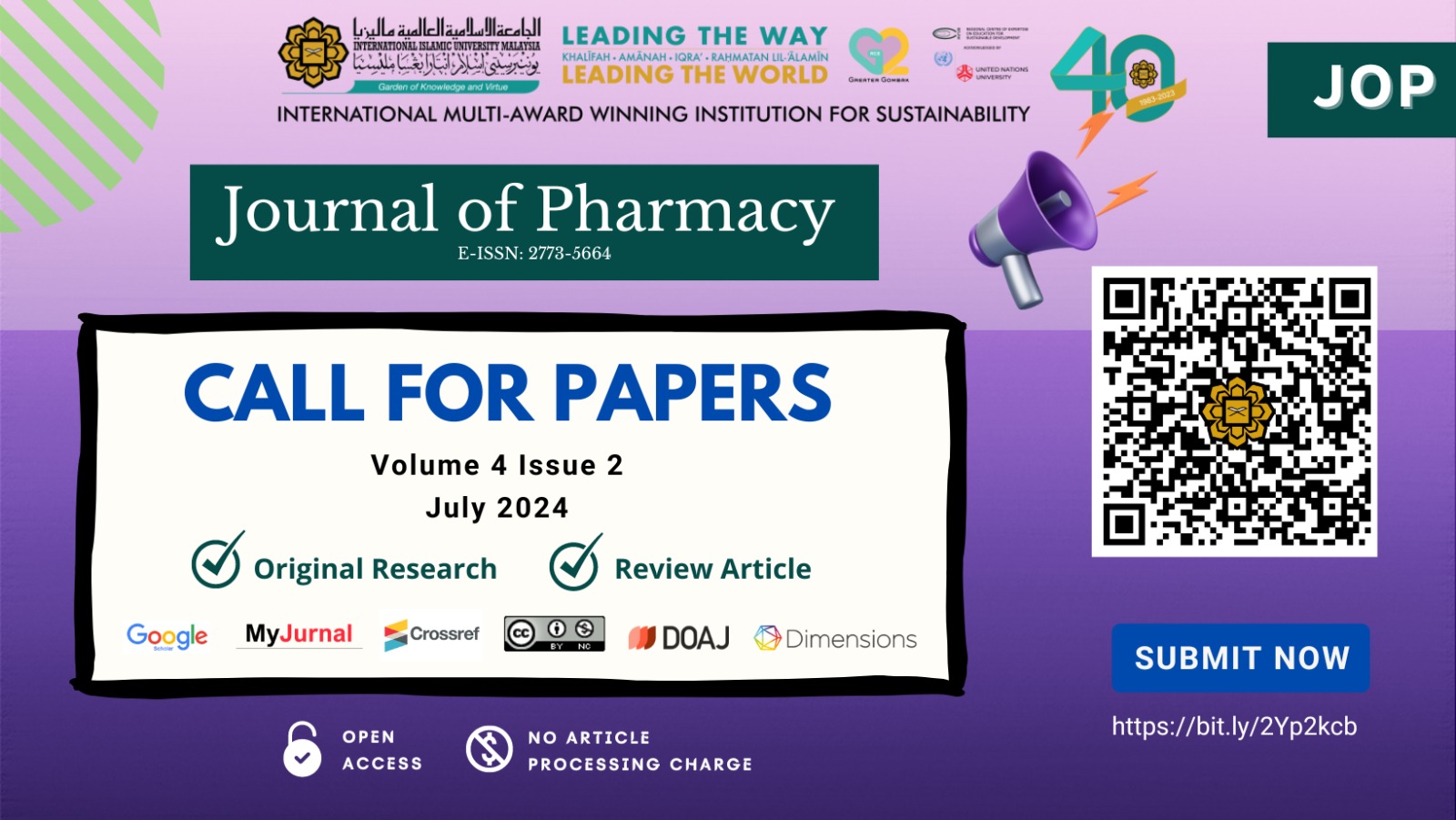Physicians’ Perception on Prescribing Potentially Inappropriate Medications for Older Patients: A Qualitative Study from Malaysia
DOI:
https://doi.org/10.31436/jop.v4i1.261Keywords:
potentially inappropriate medication (PIM), older adults, qualitative research, MalaysiaAbstract
Introduction: Many quantitative studies reported that potentially inappropriate medication (PIM) is quite prevalent among older adult patients. However, the issue is less explored qualitatively from the perspective of physicians. Objective: To qualitatively explore hospital physicians’ perception regarding PIMs, associated factors and the possible interventions to control this phenomenon. Method: A qualitative study using individual semi-structured and in-depth interview research method was constructed on 15 physicians serving in a Malaysian hospital. The purposive sampling technique was used at the beginning followed by the snowball sampling process. Results: It was found that the physicians have inadequate knowledge about PIM and the published PIM criteria . Several factors were perceived as barriers of appropriate prescribing. Firstly, physicians’ lack of knowledge and training in geriatric medicine as well as lack of time. Secondly, some of the physicians were skeptical about the applicability of PIM criteria in daily practice due to limited alternative medications. Lastly, complexity of the cases due to multimorbidity, polypharmacy and patient’s poor knowledge about their medications. The proposed interventions to optimize prescribing for older patients were education (for patients and physicians), optimization of healthcare workforce and activation of deprescribing. Conclusions: Prescribing for older patients is a complex process that is affected by numerous patient-related and doctor-related factors. Improvement strategies should target the patient, physicians and the work environment activating a joined-up working between the physician and other healthcare providers.
References
Abdulah, R., Insani, W. N., Destiani, D. P., Rohmaniasari, N., Mohenathas, N. D., & Barliana, M. I. (2018). Polypharmacy leads to increased prevalence of potentially inappropriate medication in the indonesian geriatric population visiting primary care facilities. Therapeutics and Clinical Risk Management, 14, 1591–1597. https://doi.org/10.2147/TCRM.S170475
Akkawi, M. E., Haniki, M., Mohamed, N., Aznan, M., & Aris, M. (2020). The impact of a multifaceted intervention to reduce potentially inappropriate prescribing among discharged older adults: a before-and-after study. Journal of Pharmaceutical Policy and Practice 2020 13:1, 13, 1–11. https://doi.org/10.1186/s40545-020-00236-0
Akkawi, M. E., & Mohamed, M. H. N. (2018). Influence of hospitalization on potentially inappropriate prescribing among elderly patients in a Malaysian community. Tropical Journal of Pharmaceutical Research January, 17(1), 151–160.
Akkawi, M. E., & Nik Mohamed, M. H. (2018). Are physicians and clinical pharmacists aware and knowledgeable enough about inappropriate prescribing for elderly patients? Findings from Malaysia. European Journal of Hospital Pharmacy , 25(e1), E29–E34. https://doi.org/10.1136/ejhpharm-2017-001391
Alosaimy, S., Vaidya, A., Day, K., & Stern, G. (2019). Effect of a Pharmacist-Driven Medication Management Intervention Among Older Adults in an Inpatient Setting. Drugs & Aging 2019 36:4, 36(4), 371–378. https://doi.org/10.1007/S40266-018-00634-9
Ammerman, C. A., Simpkins, B. A., Warman, N., & Downs, T. N. (2019). Potentially Inappropriate Medications in Older Adults: Deprescribing with a Clinical Pharmacist. Journal of the American Geriatrics Society, 67(1), 115–118. https://doi.org/10.1111/JGS.15623
Anderson, K., Stowasser, D., Freeman, C., & Scott, I. (2014). Prescriber barriers and enablers to minimising potentially inappropriate medications in adults: A systematic review and thematic synthesis. BMJ Open, 4(12), e006544. https://doi.org/10.1136/bmjopen-2014-006544
Beers, E., Moerkerken, D. C., Leufkens, H. G. M., Egberts, T. C. G., & Jansen, P. A. F. (2014). Participation of Older People in Preauthorization Trials of Recently Approved Medicines. Journal of the American Geriatrics Society, 62(10), 1883–1890. https://doi.org/10.1111/JGS.13067
Brkic, J., Fialova, D., Okuyan, B., Kummer, I., Sesto, S., Capiau, A., Hadziabdic, M. O., Tachkov, K., & Bobrova, V. (2022). Prevalence of potentially inappropriate prescribing in older adults in Central and Eastern Europe: a systematic review and synthesis without meta-analysis. Scientific Reports, 12(1). https://doi.org/10.1038/s41598-022-19860-8
Chang, C. T., Ang, J. Y., Islam, M. A., Chan, H. K., Cheah, W. K., & Gan, S. H. (2021). Prevalence of drug-related problems and complementary and alternative medicine use in Malaysia: A systematic review and meta-analysis of 37,249 older adults. Pharmaceuticals, 14(3), 1–17. https://doi.org/10.3390/ph14030187
Chang, C. T., Chan, H. K., Cheah, W. K., Tan, M. P., Ch’ng, A. S. H., Thiam, C. N., Abu Bakar, N. A., Yau, W. K., Abu Hassan, M. R., Rajan, P., Tan, K. C., Ambigapathy, S., Vengadasalam, P., Zaman Huri, S., Arvinder-Singh, H., Thum, C. C., Chung, W. M., Ooi, J. H., Sabki, N. H., … Lee, S. W. H. (2023). Development of a Malaysian potentially inappropriate prescribing screening tool in older adults (MALPIP): a Delphi study. Journal of Pharmaceutical Policy and Practice, 16(1). https://doi.org/10.1186/s40545-023-00630-4
Chee Teng, C., Jean Yean, Y., & Sai Hong, L. (2020). A Study on Potentially Inappropriate Medications in Geriatric Patients Admitted to the Medical Wards in Bentong Hospital Using Beers Criteria. Pharmacy Research Reports, 3(1).
Clyne, B., Cooper, J. A., Hughes, C. M., Fahey, T., & Smith, S. M. (2016). ‘Potentially inappropriate or specifically appropriate?’ Qualitative evaluation of general practitioners views on prescribing, polypharmacy and potentially inappropriate prescribing in older people. BMC Family Practice, 17(1), 1–9. https://doi.org/10.1186/s12875-016-0507-y
Cullinan, S., Fleming, A., O’Mahony, D., Ryan, C., O’Sullivan, D., Gallagher, P., & Byrne, S. (2015). Doctors’ perspectives on the barriers to appropriate prescribing in older hospitalized patients: A qualitative study. British Journal of Clinical Pharmacology, 79(5), 860–869. https://doi.org/10.1111/bcp.12555
Cullinan, S., O’Mahony, D., Fleming, A., & Byrne, S. (2014). A meta-synthesis of potentially inappropriate prescribing in older patients. Drugs and Aging, 31(8), 631–638. https://doi.org/10.1007/s40266-014-0190-4
Department of Statistics. (2016). Population Projection (Revised), Malaysia, 2010-2040. https://www.dosm.gov.my/v1/index.php?r=column/cthemeByCat&cat=118&bul_id=Y3kwU2tSNVFDOWp1YmtZYnhUeVBEdz09&menu_id=L0pheU43NWJwRWVSZklWdzQ4TlhUUT09
Fick, D. M., Semla, T. P., Steinman, M., Beizer, J., Brandt, N., Dombrowski, R., DuBeau, C. E., Pezzullo, L., Epplin, J. J., Flanagan, N., Morden, E., Hanlon, J., Hollmann, P., Laird, R., Linnebur, S., & Sandhu, S. (2019). American Geriatrics Society 2019 Updated AGS Beers Criteria® for Potentially Inappropriate Medication Use in Older Adults. Journal of the American Geriatrics Society, 67(4), 674–694. https://doi.org/10.1111/jgs.15767
Holmes, H. M., Luo, R., Kuo, Y. F., Baillargeon, J., & Goodwin, J. S. (2013). Association of potentially inappropriate medication use with patient and prescriber characteristics in Medicare Part D. Pharmacoepidemiology and Drug Safety, 22(7), 728–734. https://doi.org/10.1002/PDS.3431
Lundby, C., Graabæk, T., Ryg, J., Søndergaard, J., Pottegård, A., & Nielsen, D. S. (2019). Health care professionals’ attitudes towards deprescribing in older patients with limited life expectancy: A systematic review. British Journal of Clinical Pharmacology, 85(5), 868–892. https://doi.org/10.1111/bcp.13861
McIntosh, M. J., & Morse, J. M. (2015). Situating and constructing diversity in semi-structured interviews. Global Qualitative Nursing Research, 2. https://doi.org/10.1177/2333393615597674
Mekonnen, A. B., Redley, B., de Courten, B., & Manias, E. (2021). Potentially inappropriate prescribing and its associations with health-related and system-related outcomes in hospitalised older adults: A systematic review and meta-analysis. British Journal of Clinical Pharmacology, 87(11), 4150–4172. https://doi.org/10.1111/bcp.14870
O’Mahony, D., O’Sullivan, D., Byrne, S., O’Connor, M. N., Ryan, C., & Gallagher, P. (2015). STOPP/START criteria for potentially inappropriate prescribing in older people: version 2. Age and Ageing, 44(2), 213–218. https://doi.org/10.1093/ageing/afu145
O’Sullivan, D., O’Mahony, D., O’Connor, M. N., Gallagher, P., Gallagher, J., Cullinan, S., O’Sullivan, R., Eustace, J., & Byrne, S. (2016). Prevention of Adverse Drug Reactions in Hospitalised Older Patients Using a Software-Supported Structured Pharmacist Intervention: A Cluster Randomised Controlled Trial. Drugs and Aging, 33(1), 63–73. https://doi.org/10.1007/s40266-015-0329-y
O?Connor, M. N., Gallagher, P., & O?Mahony, D. (2012). Inappropriate Prescribing: Criteria, Detection and Prevention. Drugs & Aging, 29(6), 437–452. https://doi.org/10.2165/11632610-000000000-00000
Rodrigues, D. A., Plácido, A. I., Mateos-Campos, R., Figueiras, A., Herdeiro, M. T., & Roque, F. (2022). Effectiveness of Interventions to Reduce Potentially Inappropriate Medication in Older Patients: A Systematic Review. Frontiers in Pharmacology, 13, 3454. https://doi.org/10.3389/FPHAR.2021.777655
Schuling, J., Gebben, H., Veehof, J. G., & Haaijer-Ruskamp, F. M. (2012). Deprescribing medication in very elderly patients with multimorbidity: the view of Dutch GPs. A qualitative study. http://www.biomedcentral.com/1471-2296/13/56
Spinewine, A., Swine, C., Dhillon, S., Franklin, B. D., Tulkens, P. M., Wilmotte, L., & Lorant, V. (2005). Appropriateness of use of medicines in elderly inpatients: Qualitative study. British Medical Journal, 331(7522), 935–938. https://doi.org/10.1136/bmj.38551.410012.06
Tan, M. P., Kamaruzzaman, S. B., & Poi, P. J. H. (2018). An analysis of geriatric medicine in Malaysia-riding the wave of political change. Geriatrics (Switzerland), 3(4). https://doi.org/10.3390/geriatrics3040080
Tannenbaum, C., Martin, P., Tamblyn, R., Benedetti, A., & Ahmed, S. (2014). Reduction of Inappropriate Benzodiazepine Prescriptions Among Older Adults Through Direct Patient Education: The EMPOWER Cluster Randomized Trial. JAMA Internal Medicine, 174(6), 890–898. https://doi.org/10.1001/JAMAINTERNMED.2014.949
Tong, A., Sainsbury, P., & Craig, J. (2007). Consolidated criteria for reporting qualitative research (COREQ): A 32-item checklist for interviews and focus groups. International Journal for Quality in Health Care, 19(6), 349–357. https://doi.org/10.1093/intqhc/mzm042
Voigt, K., Gottschall, M., Köberlein-Neu, J., Schübel, J., Quint, N., & Bergmann, A. (2016). Why do family doctors prescribe potentially inappropriate medication to elderly patients? BMC Family Practice, 17(1), 1–11. https://doi.org/10.1186/s12875-016-0482-3
Xing, X. X., Zhu, C., Liang, H. Y., Wang, K., Chu, Y. Q., Zhao, L. B., Jiang, D. C., Wang, Y. Q., & Yan, S. Y. (2019). Associations Between Potentially Inappropriate Medications and Adverse Health Outcomes in the Elderly: A Systematic Review and Meta-analysis. Annals of Pharmacotherapy, 53(10), 1005–1019. https://doi.org/10.1177/1060028019853069
Xu, Z., Liang, X., Zhu, Y., Lu, Y., Ye, Y., Fang, L., & Qian, Y. (2021). Factors associated with potentially inappropriate prescriptions and barriers to medicines optimisation among older adults in primary care settings: A systematic review. In Family Medicine and Community Health (Vol. 9, Issue 4). BMJ Publishing Group. https://doi.org/10.1136/fmch-2021-001325
Zamawe, F. C. (2015). The implication of using NVivo software in qualitative data analysis: Evidence-based reflections. Malawi Medical Journal, 27(1), 13–15. https://doi.org/10.4314/mmj.v27i1.4
Downloads
Published
How to Cite
Issue
Section
License
Copyright (c) 2024 IIUM Press

This work is licensed under a Creative Commons Attribution 4.0 International License.
Journal of Pharmacy at https://journals.iium.edu.my/ktn/index.php/jp is licensed under a Creative Commons Attribution 4.0 International License.












